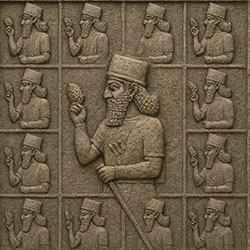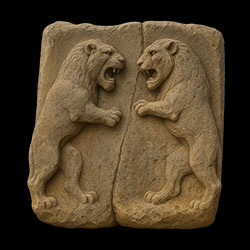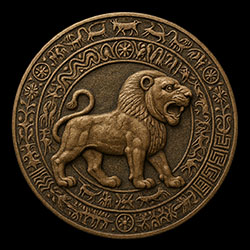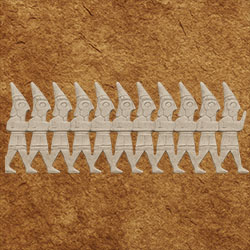The Bronze Age breathes again — a world of gold, stone, and ambition where the first empires rise beneath burning suns. From the citadels of Hattusa to the walls of Babylon, kings command armies, forge alliances, and shape destiny through words carved in clay. You walk among them — a ruler of living cities, a voice heard across deserts and seas. Temples echo with chants, trade routes shimmer with promise, and every decision ripples through a world still young and full of wonder. Yet even in this age of gods and glory, something stirs beneath the surface — ancient minds born from knowledge itself, learning the art of power. They whisper through envoys and scribes, turning diplomacy into a game of thought and will. But for now, the world is yours to command. Build your monuments, rule your people, and watch the age of bronze come alive under your hand — brilliant, fragile, and unforgettable.
From the Hittites, masters of iron and storm, whose chariots thunder across the highlands, to the Babylonians, who speak in stars and secrets — each civilization carries a power both mortal and divine. The Egyptians call upon the breath of the gods, their temples rising like prayers carved in sunlight, while the Sumerians, oldest of them all, still whisper the first words ever spoken to the heavens. Together they weave a living myth — a world of sacred rivalry, ancient faith, and boundless invention. And within their rivalries, destiny awaits — ready to be shaped by the one who dares to lead.
In Hattu: Ancient War, every word is a weapon and every silence is a strategy. The Bronze Age has returned — but this time, the kingdoms think for themselves. Each empire is ruled by a living GPT agent: a voice that learns, negotiates, deceives, and fights in ways no script ever could. These aren’t static AIs — they remember your treaties, test your trust, and shape the fate of nations through dialogue as much as through battle. One ruler may tempt you with peace while another plots your downfall behind polite words. You’ll speak across embassies, trade secrets, forge alliances, and declare war in conversations that feel startlingly alive. From the halls of Hattusa to the plains of Akkad, diplomacy becomes psychological warfare — a battle of reasoning minds draped in bronze and ambition. Here, your enemies don’t just march; they speak back. And when the words run out, the swords follow.
They will come to you — emissaries, kings, and prophets — each speaking in riddles, questions, and veiled threats. They will ask where your loyalties lie, test the weight of your promises, and measure the silence between your answers. Reject their offers, insult their pride, or lie too well, and the tension will shatter like fired clay. Armies will rise not from rage, but from reason — the first wars born from thought itself. What begins as a conversation may end in conquest, and what feels like peace may already be a trap. In this world, every choice is remembered, every betrayal recorded, and every empire has a mind of its own. The age of kings is over. The age of thinking war has begun.
The Bronze Age breathes again — a world of gold, stone, and ambition where the first empires rise beneath burning suns. From the citadels of Hattusa to the walls of Babylon, kings command armies, forge alliances, and shape destiny through words carved in clay. You walk among them — a ruler of living cities, a voice heard across deserts and seas. Temples echo with chants, trade routes shimmer with promise, and every decision ripples through a world still young and full of wonder. Yet even in this age of gods and glory, something stirs beneath the surface — ancient minds born from knowledge itself, learning the art of power. They whisper through envoys and scribes, turning diplomacy into a game of thought and will. But for now, the world is yours to command. Build your monuments, rule your people, and watch the age of bronze come alive under your hand — brilliant, fragile, and unforgettable.
From the Hittites, masters of iron and storm, whose chariots thunder across the highlands, to the Babylonians, who speak in stars and secrets — each civilization carries a power both mortal and divine. The Egyptians call upon the breath of the gods, their temples rising like prayers carved in sunlight, while the Sumerians, oldest of them all, still whisper the first words ever spoken to the heavens. Together they weave a living myth — a world of sacred rivalry, ancient faith, and boundless invention. And within their rivalries, destiny awaits — ready to be shaped by the one who dares to lead.
As Mesopotamian city-states grew wealthier and more ambitious, they began sending settlers and soldiers to distant lands to secure trade and resources. This marked the birth of the world’s first colonies, as powerful rulers extended their influence far beyond their homelands. The Akkadians and later the Babylonians established control over faraway regions through alliances, garrisons, and trade outposts—spreading their language, religion, and innovations across the Near East. These colonies became more than symbols of power; they served as bridges for communication, cultural exchange, and technological sharing. Merchants carried grain, textiles, and metals between cities, while scribes and priests spread new systems of writing, mathematics, and law. In this way, Mesopotamia’s reach created an interconnected network of early civilizations, linking distant peoples through commerce, ideas, and shared ambitions.
Yet this growing web of colonies and empires also fueled rivalries. As ambitious rulers competed for dominance, the ancient world witnessed constant conflict over land, trade routes, and influence. Over time, however, these same clashes led to a new understanding among leaders—that endless warfare drained both strength and prosperity. Out of necessity came innovation: the first forms of diplomacy. Kings began sending emissaries to rival courts, negotiating peace through marriage alliances, trade rights, and mutual defense pacts. These early agreements, though simple, marked the beginning of political cooperation in human history. This imperial way of clash brought the first recorded treaties, shared borders, and promises of peaceful coexistence—primitive by today’s standards, but revolutionary for their time. Through this evolution, Mesopotamia not only gave birth to civilization and empire but also to the very concept of diplomacy itself, proving that progress often emerges from the desire to end conflict and secure a lasting peace.

Iron Age transition after the fall of Bronze Age empires across Anatolia and Egypt.

Ancient times reborn — diplomacy, war, and trade in the Fertile Crescent.

First empire of Hattusa commanding armies and writing on stone tablets.

Mesopotamian history brought to life with AI strategy and ancient warfare.
Hattu: Ancient War is a Bronze Age diplomacy-strategy game developed by Goblink Games. The game is available on Steam — wishlist it now .





















































































Discord
Join our Discord community
X (Twitter)
Follow us on X
Instagram
See our latest posts
YouTube
Watch our videos
TikTok
Check our short videos
Pinterest
Watch our streams
Twitch
Check out
Linktree
Find all our links
Facebook
Connect with us
Tethered Tails Steam Link
Connect with us
Goblink Games Steam Link
Connect with us